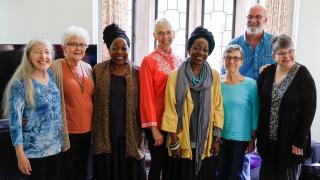What Are CLMs?
By Central East Region of the UUA

CLMs gather at a retreat in 2019.
The Central East Region’s Commissioned Lay Ministry (CLM) Program provides an opportunity for committed Unitarian Universalist leaders in the Central East region to deepen their faith while serving their congregations in more significant ways. Initiated in the Ohio-Meadville District in the 1970s, this program has commissioned dozens of lay ministers over the years, strengthening both larger and smaller congregations in the process. Individuals who satisfactorily complete the requirements and are approved by the Commissioned Lay Ministry Council, will be commissioned by their home congregation and be recognized as a “Commissioned Lay Minister”.
We asked some of our CLMs about their experiences as a CLM and here is what they told us:
Why did you decide to become a CLM?
When I served as President of our congregational Board of Trustees, I saw first-hand how much we demand from our ministers. We expect them to be available anytime and to be proficient in a diverse range of skills, such as preaching, pastoral care, administration, decision-making, etc. I decided to try the CLM program because I hoped that I could contribute in one of those areas and thereby support my congregation and our minister. ~ David Strickler, Toledo, OH
In my congregation, I was taking on more responsibility and leadership roles. I honestly didn’t know that Lay Minister was a designation (I come to UUism from Paganism, which means my structural background is different than those in more mainstream religious paths) until a fellow congregant pointed out that it would be a good fit for the role I was occupying. I was so excited about the content of the program — although I felt good about my work in my congregation, I knew that there were areas to improve. The CLM program helped me root my UUism more deeply and gave me fantastic tools for supporting my congregation as well as my own spiritual practice. ~ Irene Glasse, Frederick, MD
What do you do as a CLM?
I lead one of the largest CUUPS (Covenant of Unitarian Universalist Pagans) chapters in the country, offering ceremonies and rituals, workshops, services, and organizing a large team of fellow teachers and leaders. I regularly offer sermons at my own congregation as well as others in my region, chair a large annual outreach festival that draws upwards of 650 people to our congregation’s grounds, and organize one of our big annual fundraisers (a faery and fantasy themed masquerade ball). I also co-facilitate yoga and meditation retreats (I handle the yoga part) with my minister. ~ Irene Glasse
As a CLM at First Unitarian of Toledo, I lead four to six Sunday services and several Adult faith development sessions each year. I also lead monthly meetings of the Men’s Group. More recently, I have been representing First Unitarian of Toledo at the local Multi-Faith Council Universal Worship services.
When our senior minister was on sabbatical, I performed two memorial services. Although I was very nervous about those two services, I found it very fulfilling to work with the family members to develop a meaningful service. ~ David Strickler
What do you get from being a CLM?
I enjoy reading about UU history and considering contemporary social/cultural issues in an historical context. Prior to being a CLM, I would read a book, think about it, and then move on to the next book. As a CLM, I read and research more carefully so that I can speak confidently about the topic or issue to the congregation. Consequently, I retain the knowledge much better.
I have appreciated the opportunity to work closely with UU clergy and other CLMs who have significantly different backgrounds (race, gender, class, sex) than I do. I especially value these personal connections because their experiences have broadened my understanding of UUism and deepened my commitment to our living tradition. ~ David Strickler
Some of the most valuable things I get from being a CLM are skills and resources. The CLM program includes opportunities for skill development, guidance from experienced ministers and other CLMs, and support. Being a CLM also helps me frame my own conduct and presence in my congregation, deepening my connection to my beloved community. — Irene Glasse
If becoming a Commissioned Lay Minister sounds like something you are interested in, please check our website for details and contact us with your questions.